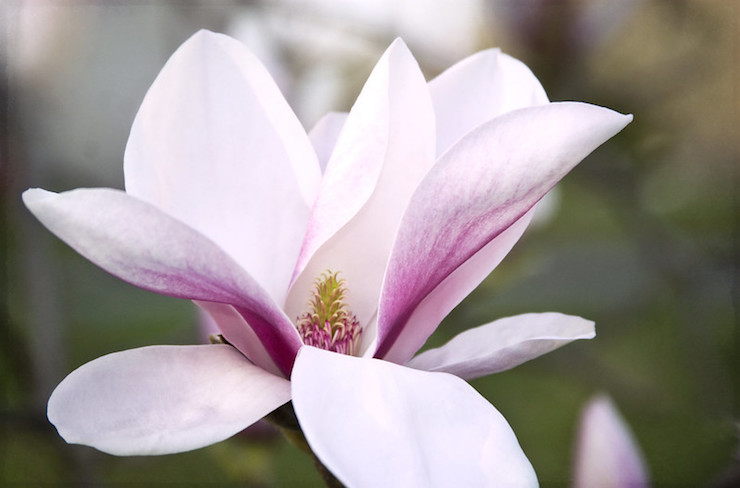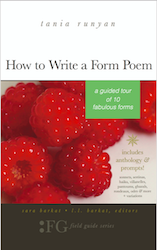Poet-a-Day: Meet Majorie Maddox
Marjorie Maddox, whom I met at a discussion circle I led at the Calvin Festival many years ago, is one of the most prolific and engaging poets I know. I’m fairly certain she’s written in every form invented since the beginning of poetic time. When she heard about How to Write a Form Poem, she submitted many lovely examples, but the pantoum below happens to be my favorite.
Here are the first few stanzas from “Bouncing Between Beds with Song.” You can find the whole poem in How to Write a Form Poem.
Bouncing Between Beds with Song (excerpt)
See the magnolia bursting
with what could be and the blue-grey
two-story shy beside it? There,
go in now, up the stairs and back too many years
into what could be, into the blue-grey
and stair-stepping into the long hallway of age,
go in now, staring full-face all the many years
that separate adult’s bed from child’s dream.
Two-stepping down the long hallway of age,
here where you cannot stand still—
between adult’s bed and child’s dream—
this is where you learned to fly…
—Marjorie Maddox
Here’s what the poet has to say about her pantoum:
Tania Runyan (TR): Tell me a little about the origin story of “Bouncing Between Beds with Song”:
Marjorie Maddox (MM): Like many of my poems, “Bouncing Between Beds with Song” began with a memory of sound, movement, and image. I am the middle child of three children, and up until I entered the first grade, we lived in a blue-grey house with a beautiful magnolia tree in the front yard. The children’s rooms (I shared with my sister) were on the second floor at one end of a long hallway, my parent’s bedroom at the other.
At the time, Mary Poppins was a favorite movie, and I knew every song by heart. My two most vivid memories of that house are the blooming magnolia tree and running from one bedroom to another, bouncing on every bed, and singing at the top of my lungs “Let’s Go Fly a Kite.” These are memories I still associate with beauty, joy, and a sense of carefree abandonment.
TR: Why did you choose to write the poem as a pantoum? Or did the form “cause” the poem?
MM: The music, the motion, and the images of that one childhood experience rushed back—the way many recollections do—quickly and vividly, the poem transitioning naturally to a meditation on memory, choice, aging, and writing.
Why, though, a pantoum? Two reasons:
1) In 2012, I was taking part in a small writing retreat housed at an old convent. Most of the attendees were published children’s authors there to “stretch and grow” as poets. I was primarily a poet, who also writes children’s books, attending to learn more about children’s literature. Each year, the group hosted an award-winning visiting poet to lead workshops. So, both childhood and poetry were on my mind. This poem came out of a discussion of and workshop on writing the pantoum, led by Lesléa Newman.
2) Because of its use of repetition, the pantoum seems to me one of several forms (alongside the villanelle and the triolet) particularly suited for a meditation on memory. The movement of a pantoum is, indeed, one of remembrance—repetition and variation—and the ways we are encouraged or haunted by such memories.
TR: What do you hope poets can learn from a book like How to Write a Form Poem?
MM: That the fence of poetic form quite often opens the gates into a vast landscape of imaginative freedom, terrain you may not have anticipated or even known existed. Allow yourself the joy of exploration.
About Marjorie Maddox
Winner of America Magazine’s 2019 Foley Poetry Prize and Professor of English and Creative Writing at Lock Haven University, Marjorie Maddox has published eleven collections of poetry—including Transplant, Transport, Transubstantiation (Yellowglen Prize and finalist for the Brittingham Poetry Prize); True, False, None of the Above (Poiema Poetry Series, Illumination Book Award Medalist); and Perpendicular As I (Sandstone Book Award). She is also the author of four children’s and YA books and 600+ stories, essays, and poems in journals and anthologies. Her book Begin with a Question is due out from Paraclete Press in Spring 2021. The chair of the jury of judges for the 2020 Lee Bennett Hopkins Poetry Book Award, she gives readings and workshops around the country.
Hear Marjorie Read “Bouncing Between Beds With Song”
go to 52:12 to hear Marjorie read
Photo by Liz West, Creative Commons, via Flickr. Post by Tania Runyan.
Browse more Poet-a-Day
Browse 50 States of Generosity
Check out The Yellow Wall-paper Graphic Novel
BUY ‘HOW TO WRITE A FORM POEM’ NOW!
- Flowers of California: California Poppy - December 8, 2022
- Flowers of California: Lily of the Nile - October 13, 2022
- Flowers of California: Crape Myrtle - October 5, 2022



Marjorie says
Tania, thanks so much for these interviews and—of course—for this wonderful book. I and many others are looking forward to the new poems that you will help usher in with your good work. Gratitude!
Tania Runyan says
Thank YOU! And I love what you have to say about form. I truly hope a form renaissance results from this book and all of these wise words!
Marjorie says
Oh, and I confess (with shame) that I don’t think I’ve ever written a haiku (except maybe in elementary school)! Unbelievable. I’m sure that your book will change that. 🙂 Are there forms that you tried for the first time when writing this book?
Tania Runyan says
And I bet the way you were taught haiku in elementary school is different from what you’ll discover in the book! (Hint: no 5-7-5, at least in the way we were all taught). I had indeed tried every form in the book before writing it with the exception of the some of the variations/extensions Sara Barkat added in the “Go the Extra Mile” sections. I’ll be trying them out soon!
Sandra Heska King says
“. . . the fence of poetic form quite often opens the gates into a vast landscape of imaginative freedom, terrain you may not have anticipated or even known existed.” I love that.
I also love imagining you bouncing on every bed and singing that great song.
Marjorie says
Sandra,
Isn’t it amazing how some memories vividly stay with us throughout our lives? This childhood memory is, for me, one of those, full of joy and possibility–just like the song.
Laurie Klein says
Marjorie, I love the playful way you enter and seamlessly bring us along with you, reliving a small island calmly afloat in the slippage of time. You are one of the most versatile, winsome, articulate, adventurous, and prolific poets I like to think that I know . . . a wee bit.
Marjorie says
Aw, thank you. And more than a wee bit! Poetry buds become friends quickly…